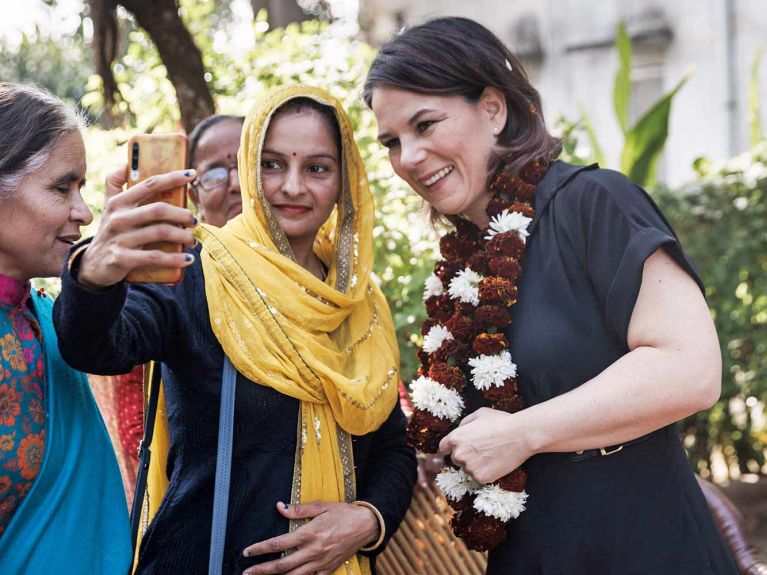Feminist foreign policy: Strengthening equality
Germany’s Foreign Minister Annalena Baerbock and Development Minister Svenja Schulze present guidelines for feminist foreign and development policy.

In future, German foreign and development policy will be based to a greater extent on feminist criteria with a view to increasing equality, equal participation and peace and security worldwide. To this end, Germany’s Foreign Minister Annalena Baerbock and Development Minister Svenja Schulze presented an 80-page catalogue of guidelines for feminist foreign policy. And, as Baerbock stressed, it is not a question of making “foreign policy for women, but for all members of society”.
What is meant by feminist foreign policy?
Sweden, which like a number of other countries already practises feminist foreign policy, is seen as a trailblazer in this area. Canada, France, Luxembourg, Mexico and Spain also pursue an explicitly feminist foreign policy. Though Germany’s foreign and development policy was already committed in the past to upholding the rights of women and girls and to promoting gender sensitivity, the new guidelines are designed to implement international commitments to gender justice and equal participation in an even more resolute and targeted manner.
Kristina Lunz from the Centre for Feminist Foreign Policy is one of the pioneers of feminist foreign policy in Germany and believes that realigning policy is necessary in view of the wars and conflicts worldwide: “The traditional approaches to foreign and security policy have only resulted in the number of conflicts doubling around the world in the last few years,” Lunz told German TV station ARD. Baerbock emphasised that the concept was an integral part of values-driven foreign policy and should also be reflected in the National Security Strategy in line with “a comprehensive understanding of security”.
What role do women play when it comes to peace and security?
Women do important work in many crisis regions: They create safe spaces, stand up against violence and highlight injustices and problems. Without the courageous protests of women in Belarus or Iran the repressions there would not have become the focus of public attention to the extent they have. This is also why Germany, in its policy, is also committed to implementing the United Nations’ “Women, Peace, Security” agenda and has adopted national action plans accordingly.
In their coalition agreement, the governing parties SPD, Alliance 90/The Greens and FDP had stated the following in 2021: “Together with our partners, we want to strengthen the rights, resources and representation of women and girls worldwide and promote social diversity with a feminist foreign policy in mind. We want to appoint more women to international leadership positions and ambitiously implement and further develop the National Action Plan for the implementation of UN Resolution 1325.”
What will change in foreign policy?
According to Baerbock, the goal of feminist foreign policy is for 85 percent of project funding to be “gender-sensitive” by the end of the legislative period so as to strengthen women’s rights and give direct consideration to the needs of women. When it comes to humanitarian assistance, for example, consideration is to be given to the fact that women need different hygiene articles than men. Two thirds of the total budget of around 7.5 billion euros are project funds; in future, “gender budgeting” will dictate how this 5 billion euros or so is spent.
Six guidelines for feminist foreign policy state the following: “We integrate the perspectives of women and marginalised groups into our worldwide work for peace and security.” The central role played by women in climate policy is also highlighted: Women and diverse societal groups are “important stakeholders and leading players in our climate and energy diplomacy.” Furthermore, the specific impact of the climate crisis on women is to be counterbalanced. According to the United Nations, up to 80 percent of the people forced to flee from climate-related disasters in 2021 were women.
What role is played by women in the foreign service?
The policy realignment will also have concrete consequences for the Federal Foreign Office: for example, the post of “woman ambassador of the Federal Foreign Office for feminist foreign policy” is to be created, above all to shape the way the Foreign Office works internally. “We will work hard to give our foreign service a more female face and to increase the proportion of women in leadership positions,” the minister announced.
If women have equal rights and bear equal responsibility, there will be less poverty, less hunger and more stability in the world.
What form will feminist development policy take in future?
“If women have equal rights and bear equal responsibility, there will be less poverty, less hunger and more stability in the world,” is how Development Minister Schulze describes the gender-sensitive approach. Her guidelines stipulate that by 2025 more than 90 percent of the newly approved financial resources will be channelled into projects that advance gender equality. The concept of feminist development policy is to be firmly anchored in cooperation with partner countries. At least 50 percent of the leadership positions in the ministry are to be filled by women.
(with the dpa)


